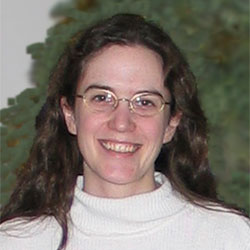The hypothesis: I am tense and so are you.
We neither meet nor separate.
The desired result: We meet in the absence.
The proof: As tension turns people into arcs, we are two arcs.
We neither meet nor separate (the hypothesis)
so we must be parallel.
If two parallel lines are bisected by a third line
(in this case, the line of tension)
their corresponding angles must be equal (a geometrical theorem).
So we are congruent (because shapes are congruent
when their angles are equal)
and we form a circle (since the sum
of two congruent arcs
is a circle).
Therefore, we meet in the absence
(since the circumference of a circle
is the sum of contiguous points
which can each be considered
a point of contact).
Notes on the Poem
By laying it out in seemingly dry and clinical fashion, do Dunya Mikhail and her translator, Elizabeth Winslow make the dilemma captured in the poem "The Theory of Absence" more or less emotionally fraught? With the crisp subheadings "The hypothesis:" "The desired result:" and "The proof:" the tense situation between two persons (adversaries? a couple? both?) is delineated in a cold and literally calculated manner on one hand. At the same time, presenting the situation like a mathematical problem gives it the implied strength of a universally understood - and therefore solvable - concept. Does that mean there is hope for this tense pair? In fact, it seems that Mikhail and Winslow have given this poem resonant emotional heft by the counter-intuitive method of draining it of apparent feeling. By the time you reach the line "So we are congruent" you might even have a sense that the poem is tinged with humour. You might even be reaching for pen and paper to map out what the poem is describing. It's making some good sense, isn't it? Finally, as the poem (and perhaps your sketch of what the poem describes) concludes with "a point of contact", things are decidedly ending on an optimistic note. The tense situation might just be resolved. It just needed to be laid out logically, like an equation. As the Griffin Poetry Prize judges' citation noted "[Mikhail's] particular skill is the invention of unadorned images that capture the often unexpected human responses". In combination with Winslow's skilful translation, that is definitely on display in this intriguing selection from The War Works Hard.
